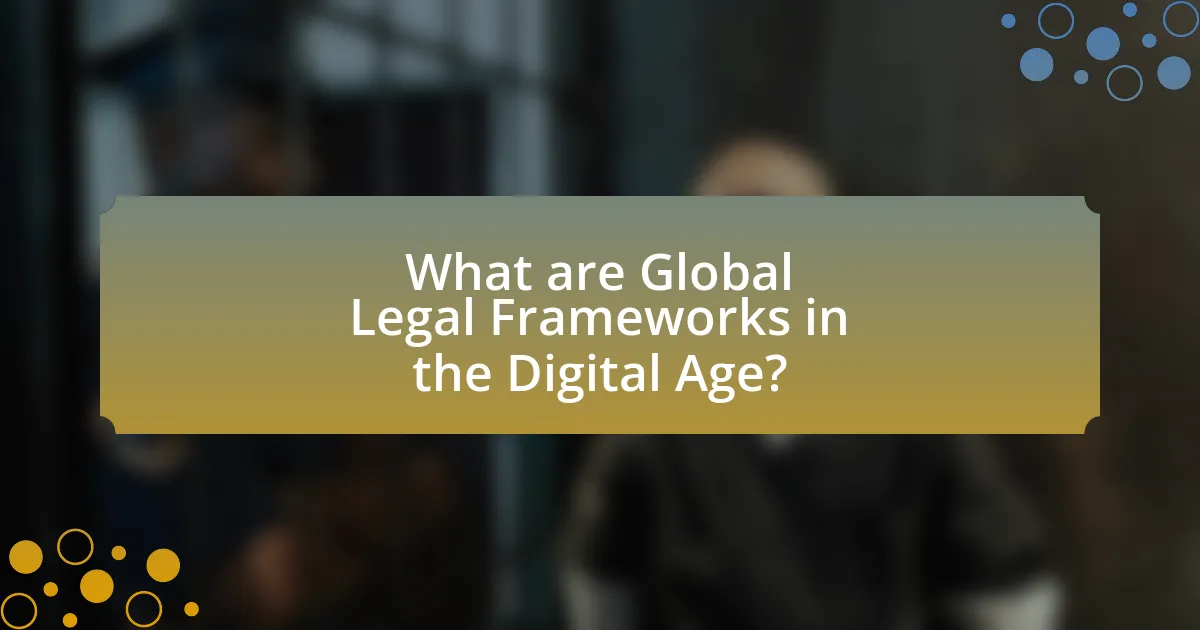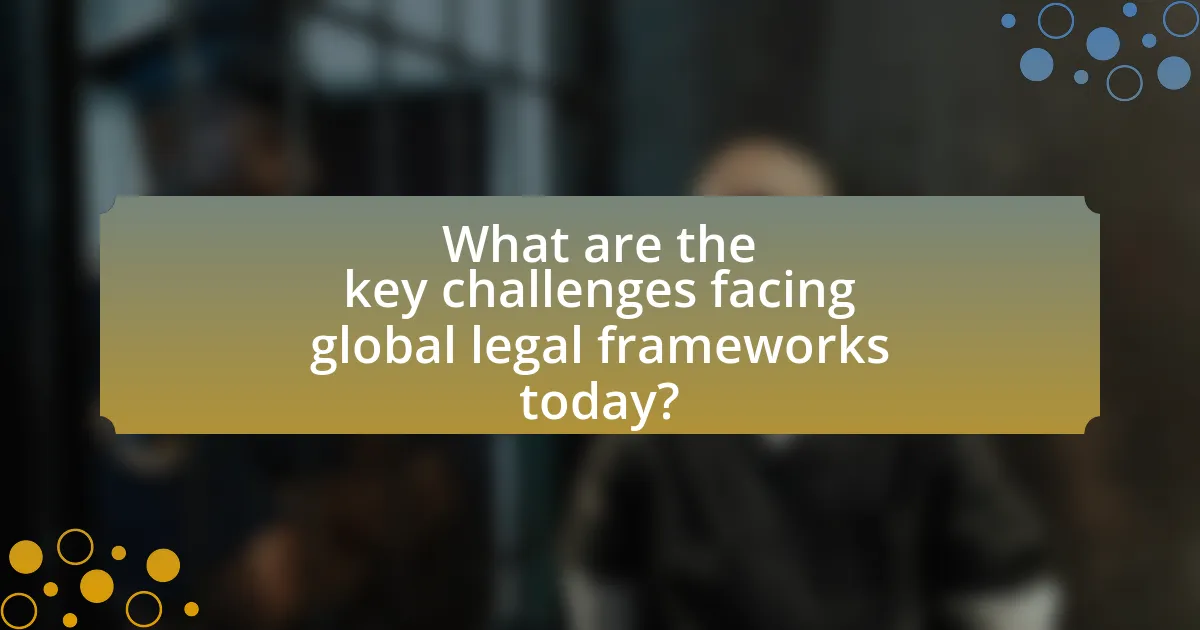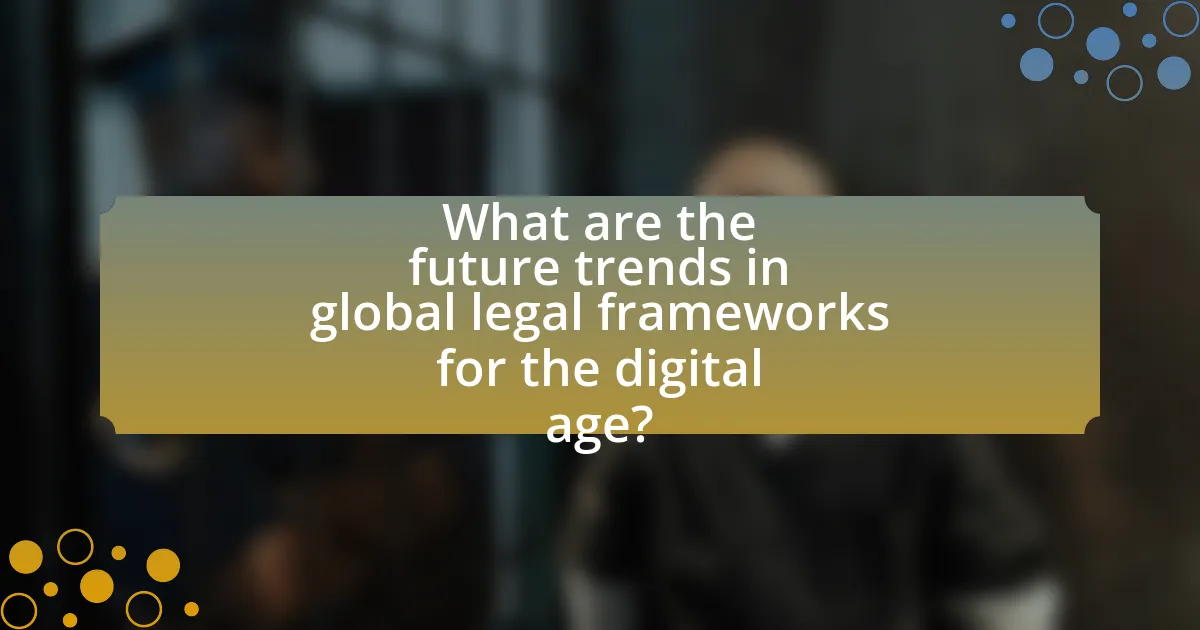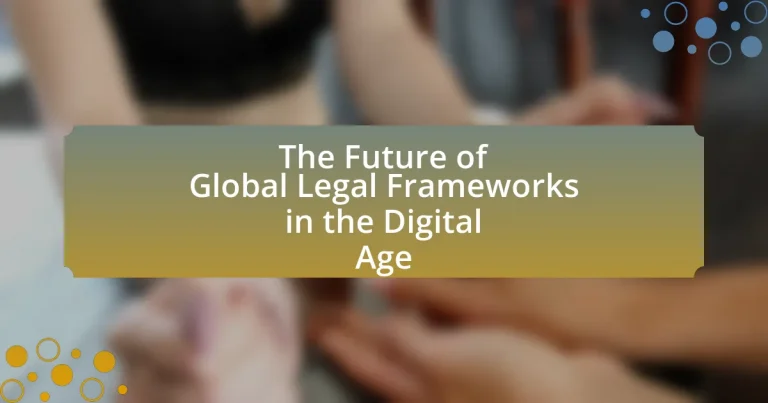Global legal frameworks in the digital age encompass international laws, regulations, and agreements that govern digital activities across borders, addressing critical issues such as data protection, cybersecurity, intellectual property rights, and e-commerce. The article explores how digital advancements necessitate the adaptation of these frameworks, highlighting the influence of technologies like artificial intelligence and blockchain on legal norms. It discusses the challenges posed by differing national laws, jurisdictional conflicts, and the need for harmonization, while emphasizing the role of international organizations in shaping cohesive legal standards. Additionally, the article examines future trends in legal frameworks, including the impact of emerging technologies and the importance of stakeholder engagement in developing adaptable legal structures.

What are Global Legal Frameworks in the Digital Age?
Global legal frameworks in the digital age refer to the set of international laws, regulations, and agreements that govern digital activities across borders. These frameworks address issues such as data protection, cybersecurity, intellectual property rights, and e-commerce, aiming to create a cohesive legal environment that facilitates global digital interactions. For instance, the General Data Protection Regulation (GDPR) implemented by the European Union sets a high standard for data privacy that influences global practices, demonstrating how regional laws can shape international norms. Additionally, treaties like the Budapest Convention on Cybercrime establish cooperative measures among countries to combat cybercrime, highlighting the necessity of collaborative legal approaches in the digital landscape.
How have digital advancements influenced global legal frameworks?
Digital advancements have significantly influenced global legal frameworks by necessitating the adaptation of laws to address issues such as data privacy, cybersecurity, and intellectual property rights. For instance, the General Data Protection Regulation (GDPR) implemented by the European Union in 2018 set a precedent for data protection laws worldwide, compelling countries to enhance their legal standards regarding personal data handling. Additionally, the rise of digital currencies has prompted regulatory bodies to develop frameworks for cryptocurrency governance, as seen in the Financial Action Task Force (FATF) guidelines aimed at combating money laundering and terrorist financing. These advancements have led to a more interconnected legal landscape, where international cooperation is essential for addressing cross-border legal challenges arising from digital technologies.
What specific technologies are impacting legal frameworks?
Artificial intelligence, blockchain, and data privacy technologies are significantly impacting legal frameworks. Artificial intelligence is transforming legal research and contract analysis, enabling faster and more accurate decision-making. Blockchain technology is enhancing transparency and security in transactions, leading to new legal considerations around smart contracts and digital assets. Data privacy technologies, driven by regulations like GDPR, are reshaping compliance requirements and influencing how organizations manage personal data. These technologies collectively challenge existing legal norms and necessitate the adaptation of legal frameworks to address emerging issues in the digital landscape.
How do these technologies challenge existing laws?
Emerging technologies such as artificial intelligence, blockchain, and the Internet of Things challenge existing laws by creating scenarios that current legal frameworks are ill-equipped to address. For instance, AI can make autonomous decisions that raise questions about liability and accountability, as traditional laws often require a human actor to assign responsibility. Additionally, blockchain’s decentralized nature complicates regulatory oversight, as it operates outside conventional jurisdictional boundaries, making it difficult for governments to enforce existing laws related to data privacy and financial transactions. These challenges necessitate a reevaluation of legal principles to accommodate the rapid evolution of technology and its implications for society.
Why is it important to adapt legal frameworks for the digital age?
Adapting legal frameworks for the digital age is crucial to ensure that laws remain relevant and effective in addressing contemporary challenges posed by technology. The rapid advancement of digital technologies, such as artificial intelligence, blockchain, and data privacy issues, has outpaced existing legal structures, leading to gaps in regulation that can result in misuse, exploitation, and legal ambiguities. For instance, the General Data Protection Regulation (GDPR) in the European Union exemplifies a proactive approach to data privacy, demonstrating the necessity of updating legal frameworks to protect individuals’ rights in a digital context. Without such adaptations, societies risk undermining legal protections and failing to foster innovation while ensuring accountability in the digital landscape.
What risks arise from outdated legal frameworks?
Outdated legal frameworks pose significant risks, including the inability to address emerging technologies and societal changes effectively. These frameworks often fail to regulate issues such as data privacy, cybersecurity, and intellectual property rights in the digital age, leading to legal ambiguities and gaps. For instance, the General Data Protection Regulation (GDPR) was implemented to address data privacy concerns that older laws could not adequately cover. Without updates, legal systems may struggle to protect citizens and businesses, resulting in increased vulnerability to cyber threats and exploitation. Additionally, outdated laws can hinder innovation by creating barriers for new technologies, as seen in the slow adaptation of laws regarding blockchain and artificial intelligence.
How can modern legal frameworks enhance digital security?
Modern legal frameworks can enhance digital security by establishing clear regulations and standards that govern data protection and cybersecurity practices. These frameworks, such as the General Data Protection Regulation (GDPR) in Europe, mandate organizations to implement robust security measures to protect personal data, thereby reducing the risk of data breaches. For instance, GDPR imposes strict penalties for non-compliance, incentivizing companies to prioritize security protocols. Additionally, legal frameworks can facilitate international cooperation in combating cybercrime, as seen in treaties like the Budapest Convention on Cybercrime, which promotes collaboration among countries to address digital threats effectively.

What are the key challenges facing global legal frameworks today?
The key challenges facing global legal frameworks today include the rapid pace of technological advancement, jurisdictional conflicts, and the need for harmonization of laws across different countries. Technological advancements, such as artificial intelligence and blockchain, outpace existing legal structures, creating gaps in regulation and enforcement. Jurisdictional conflicts arise when laws from different countries intersect, leading to complications in legal accountability and compliance. Additionally, the lack of uniformity in laws regarding data protection, intellectual property, and cybersecurity complicates international cooperation and enforcement, as seen in the discrepancies between the General Data Protection Regulation in Europe and various laws in the United States. These challenges necessitate a reevaluation and adaptation of legal frameworks to effectively address the complexities of the digital age.
How do differing national laws affect global digital interactions?
Differing national laws significantly impact global digital interactions by creating a fragmented legal landscape that complicates compliance for businesses and users. For instance, the General Data Protection Regulation (GDPR) in the European Union imposes strict data privacy requirements, while the United States has a more fragmented approach with laws like the California Consumer Privacy Act (CCPA). This divergence forces companies operating internationally to navigate varying regulations, which can lead to increased operational costs and legal risks. Additionally, differing laws can hinder cross-border data flows, as seen when countries impose data localization requirements, restricting where data can be stored and processed. Such legal disparities can also affect user experiences, as individuals may encounter different levels of privacy protection and content accessibility based on their location.
What are the implications of jurisdiction in the digital space?
Jurisdiction in the digital space significantly impacts legal accountability and enforcement of laws across borders. As digital interactions often transcend geographical boundaries, determining which legal framework applies becomes complex, leading to potential conflicts between national laws. For instance, the European Union’s General Data Protection Regulation (GDPR) applies to any entity processing the data of EU citizens, regardless of the entity’s location, illustrating how jurisdiction can extend beyond traditional borders. This complexity can result in challenges for businesses operating internationally, as they must navigate varying legal requirements and potential penalties for non-compliance. Additionally, the lack of a unified global legal framework can lead to jurisdictional disputes, complicating the resolution of legal issues arising from online activities.
How can harmonization of laws be achieved internationally?
Harmonization of laws can be achieved internationally through the establishment of treaties and agreements that create uniform legal standards across jurisdictions. These treaties, such as the United Nations Convention on Contracts for the International Sale of Goods, facilitate cross-border trade by providing a consistent legal framework. Additionally, international organizations like the World Trade Organization and the International Law Commission play crucial roles in promoting legal harmonization by developing model laws and guidelines that member states can adopt. This collaborative approach ensures that countries align their legal systems, thereby reducing conflicts and enhancing cooperation in the global legal landscape.
What role do international organizations play in shaping legal frameworks?
International organizations play a crucial role in shaping legal frameworks by establishing norms, standards, and treaties that guide member states in their legal practices. For instance, the United Nations develops international law through conventions and resolutions, influencing national legislation and promoting compliance among countries. The World Trade Organization sets trade rules that member countries must follow, thereby impacting domestic legal systems. Additionally, organizations like the International Criminal Court provide mechanisms for accountability and justice, which further shapes legal frameworks globally. These contributions are essential for fostering cooperation and addressing transnational issues in the digital age, such as cybersecurity and data protection.
How do organizations like the UN influence digital law?
Organizations like the UN influence digital law by establishing international norms and frameworks that guide member states in creating their own digital regulations. The UN’s initiatives, such as the Internet Governance Forum and the Global Digital Compact, promote dialogue among governments, civil society, and the private sector, fostering cooperation on issues like cybersecurity, data privacy, and digital rights. For example, the UN’s 2030 Agenda for Sustainable Development emphasizes the importance of inclusive digital access, which encourages countries to adopt laws that support equitable digital environments. This collaborative approach helps shape national policies and encourages adherence to international standards, thereby impacting the evolution of digital law globally.
What initiatives are being taken to standardize digital laws globally?
Various initiatives are being undertaken to standardize digital laws globally, including the development of international agreements and frameworks. The European Union’s General Data Protection Regulation (GDPR) serves as a model for data protection laws worldwide, influencing legislation in countries such as Brazil and Japan. Additionally, the United Nations has initiated discussions on a global digital compact aimed at establishing common principles for digital governance. The OECD’s Guidelines on Artificial Intelligence also promote international cooperation and shared standards in AI regulation. These efforts reflect a growing recognition of the need for cohesive legal frameworks to address the complexities of digital technology across borders.

What are the future trends in global legal frameworks for the digital age?
Future trends in global legal frameworks for the digital age include increased regulation of data privacy, enhanced cybersecurity laws, and the establishment of international standards for digital transactions. As governments recognize the importance of protecting personal data, regulations similar to the European Union’s General Data Protection Regulation (GDPR) are likely to emerge worldwide, mandating stricter compliance for organizations handling personal information. Additionally, with the rise of cyber threats, countries are expected to implement more robust cybersecurity legislation to safeguard critical infrastructure and sensitive data. Furthermore, the globalization of digital commerce will drive the need for harmonized legal standards to facilitate cross-border transactions, ensuring consistency and security in digital trade. These trends reflect a growing recognition of the need for comprehensive legal frameworks that address the complexities of the digital landscape.
How will artificial intelligence impact legal frameworks?
Artificial intelligence will significantly impact legal frameworks by necessitating updates to regulations and compliance standards. As AI technologies evolve, they introduce complexities in areas such as data privacy, intellectual property, and liability, which existing legal frameworks may not adequately address. For instance, the General Data Protection Regulation (GDPR) in Europe has already begun to adapt to AI by emphasizing data protection and user consent, highlighting the need for legal systems to evolve in response to technological advancements. Furthermore, AI’s role in automating legal processes and decision-making raises questions about accountability and fairness, prompting legal scholars and policymakers to reconsider traditional legal principles.
What legal considerations arise from AI decision-making?
Legal considerations arising from AI decision-making include accountability, bias, transparency, and data protection. Accountability pertains to determining who is responsible for decisions made by AI systems, especially in cases of harm or discrimination. Bias in AI can lead to unfair treatment of individuals based on race, gender, or other characteristics, raising concerns under anti-discrimination laws. Transparency is crucial for understanding how AI systems make decisions, which is necessary for compliance with regulations like the General Data Protection Regulation (GDPR) that mandates explainability. Data protection laws require that personal data used in AI decision-making is handled in accordance with privacy regulations, ensuring individuals’ rights are respected. These considerations are essential for developing a robust legal framework that addresses the complexities introduced by AI technologies.
How can laws evolve to address AI-related challenges?
Laws can evolve to address AI-related challenges by incorporating adaptive regulatory frameworks that respond to technological advancements. This evolution can be achieved through continuous stakeholder engagement, including technologists, ethicists, and legal experts, to ensure that regulations remain relevant and effective. For instance, the European Union’s General Data Protection Regulation (GDPR) has set a precedent by establishing guidelines for data protection that adapt to new technologies, demonstrating how legal frameworks can evolve in response to emerging challenges in AI. Additionally, jurisdictions can implement iterative policy reviews and pilot programs to assess the impact of AI technologies and adjust regulations accordingly, ensuring that laws keep pace with rapid advancements in AI capabilities.
What emerging technologies will shape future legal frameworks?
Emerging technologies such as artificial intelligence, blockchain, and quantum computing will significantly shape future legal frameworks. Artificial intelligence can automate legal research and contract analysis, enhancing efficiency and accuracy in legal processes. Blockchain technology offers secure and transparent transaction records, which can revolutionize property rights and contract enforcement. Quantum computing has the potential to solve complex legal problems faster than traditional computing, impacting areas like intellectual property and data privacy. These technologies are already influencing legal practices and will continue to drive changes in regulations and compliance as they evolve.
How will blockchain technology influence legal contracts?
Blockchain technology will significantly influence legal contracts by enabling smart contracts, which are self-executing agreements with the terms directly written into code. This innovation enhances transparency, reduces the need for intermediaries, and minimizes the risk of fraud, as transactions are recorded on an immutable ledger. According to a report by the World Economic Forum, by 2025, 10% of global GDP could be stored on blockchain technology, indicating a substantial shift in how contracts are managed and enforced.
What are the potential legal implications of virtual reality?
The potential legal implications of virtual reality include issues related to intellectual property, privacy, liability, and regulatory compliance. Intellectual property concerns arise as creators may face challenges in protecting their digital assets within virtual environments, where content can be easily replicated or modified. Privacy implications are significant, as VR systems often collect extensive user data, raising questions about consent and data protection under laws such as the General Data Protection Regulation (GDPR). Liability issues may emerge when users experience harm or injury within virtual spaces, leading to debates over who is responsible—the developers, platform providers, or users themselves. Regulatory compliance is also a concern, as existing laws may not adequately address the unique aspects of virtual reality, necessitating new legal frameworks to govern its use effectively.
What best practices can be adopted for developing future legal frameworks?
To develop future legal frameworks effectively, it is essential to adopt a multi-stakeholder approach that includes input from governments, private sector entities, civil society, and academia. This collaborative method ensures that diverse perspectives are considered, leading to more comprehensive and adaptable legal structures. For instance, the European Union’s General Data Protection Regulation (GDPR) exemplifies this practice by incorporating feedback from various stakeholders during its formulation, resulting in a robust framework that addresses privacy concerns in the digital age. Additionally, employing iterative processes that allow for regular updates and revisions based on technological advancements and societal changes is crucial. This adaptability is supported by the fact that technology evolves rapidly, necessitating legal frameworks that can keep pace with innovations such as artificial intelligence and blockchain.
How can stakeholder engagement improve legal framework development?
Stakeholder engagement can significantly enhance legal framework development by ensuring that diverse perspectives and needs are incorporated into the process. Engaging stakeholders, such as community members, industry representatives, and legal experts, fosters collaboration and transparency, which leads to more comprehensive and effective legal frameworks. For instance, the World Bank emphasizes that inclusive stakeholder participation can improve the legitimacy and acceptance of laws, as seen in various countries where public consultations have led to more tailored regulations that address specific local issues. This collaborative approach not only increases the relevance of the legal framework but also promotes compliance and reduces conflicts, ultimately resulting in a more robust legal system.
What strategies can ensure adaptability in legal frameworks?
To ensure adaptability in legal frameworks, implementing continuous review and revision processes is essential. This strategy allows legal systems to respond effectively to rapid technological advancements and societal changes. For instance, jurisdictions that have established regular assessments of existing laws, such as the European Union’s approach to digital regulations, demonstrate how proactive adjustments can address emerging challenges like data privacy and cybersecurity. Additionally, fostering collaboration between legal experts, technologists, and stakeholders can enhance the relevance and applicability of laws in a digital context, as seen in initiatives like the OECD’s Digital Economy Policy. These strategies collectively promote a dynamic legal environment capable of evolving alongside technological progress.


